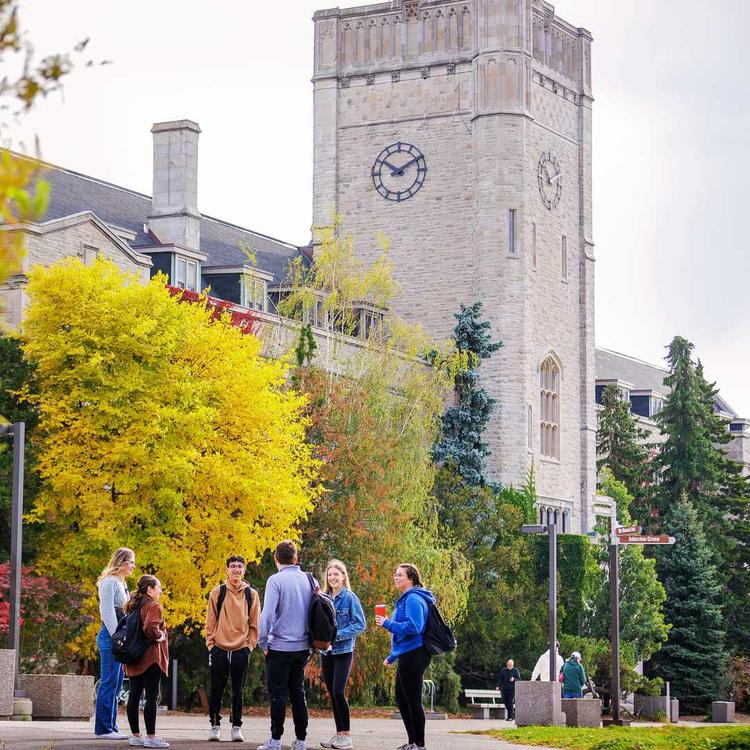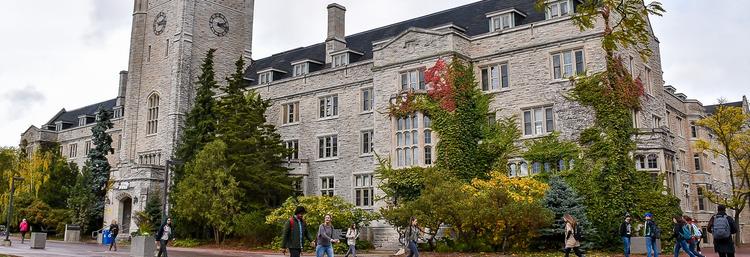Financial Aid
How Do I Fund My Education?
There are multiple ways to fund your education, including scholarships, bursaries, government financial aid, Work Study, and more. Learn about these options below.
Our fundamental principle is that, working in partnership with government and students, all qualified individuals should be able to attend university regardless of their financial status. We are proud of our innovative financial aid programs that are specifically geared to ensuring an accessible, top-quality education for all students.

Scholarships & Bursaries
The University of Guelph has an extremely generous award program to support our students.
Scholarships are given on the basis of meritorious achievement and can include things like extra-curricular activities, demonstrated leadership ability and volunteerism. Bursaries are given to students who apply and demonstrate a financial shortfall in their study period budget.

Financial Support for First Nations, Inuit, and Métis Students and Black, Persons of Colour or Racialized Students
The University of Guelph has a long-standing commitment to equity, diversity and inclusion on our campuses. One of the initiatives highlighted in the University's action plan is to create new awards for students who are First Nations, Inuit, and Métis as well as Black, Persons of Colour or Racialized Students.

International Student Support
The University of Guelph offers a range of financial aid programs for international students, including scholarships, bursaries and Work Study.

Work Study Program
The Work Study Program provides students with demonstrated financial need the opportunity to meet their educational costs while developing transferable knowledge, skills, and attitudes through part-time paid work experiences on campus during their registered term.

Undergraduate Summer Research Opportunities
Full-time summer research positions are available for undergraduate students through four competitive and unique programs. Students gain valuable research experience while working under the supervision and mentorship of University of Guelph faculty.

Travel Grants
We're committed to seeing that University of Guelph students have the opportunity to experience different cultures and communities while enhancing their learning experiences. Travel grants are provided to eligible students who wish to travel for a curriculum-embedded opportunity. These grants are used to offset additional costs associated with travelling, like, airfare, vaccinations and travel insurance costs.

Financial Aid Counselling
Financial Aid counsellors are available on an appointment basis to assist students in need. Counsellors can assist with budget counselling, OSAP appeals, bursary appeals and emergency funding requests.
Drop-in appointments are offered at the beginning of each semester.
Emergency counselling is available; if you find yourself in an emergency financial situation, contact our office immediately.
- $48.6 Million in Financial Aid Awarded
- Allocated to students through our financial aid programs in 2023/24.
- $11.9 Million In Need-Based Scholarships & Bursaries Awarded
- Allocated to Undergraduate and Graduate students through scholarships and bursaries in 2023/24.
- 503 Work Study Positions
- Students working across campus in 2023/24 through the Work Study Program.
- 480 Travel Grants Awarded
- In 2023/24, students travelled to 39 countries across six continents with support from travel grants.
Financial Aid Options - Outside U of G
Learn How OSAP Can Help
OSAP is available to eligible students in the form of grants and an integrated student loan funded by the Province of Ontario and Government of Canada. The grant portion does not need to be paid back. The loans are interest-free while you are in full-time studies; repayment begins six months later. OSAP's objective is to help students meet the costs of post-secondary education, including tuition, books, supplies and basic living expenses. OSAP is not intended to supply all the funding to meet these costs. OSAP's purpose is to supplement, not to replace, the financial resources that you (and your family) are expected to contribute.
U.S. Government Student Aid
The U.S. direct loan program includes two types of loans: William D. Ford Federal Direct Loans and Direct PLUS (Parent and Grad) loans.
Budgeting & Financial Literacy
Paying for your education begins with a plan. A good financial plan will include an estimate of resources and costs over your academic career. To have a financial plan you need to learn about budgeting and be financially literate.
A financial plan provides an opportunity to evaluate your current financial situation and make sound decisions for the future.
Don't Forget About Out-of-Province Financial Aid
Out-of-province students must apply through their home province or territory in order to receive government assistance. Visit the website for your home province or territory below for detailed information on how to apply for student aid.
- British Columbia
- Alberta
- Saskatchewan
- Manitoba
- Quebec
- New Brunswick
- Nova Scotia
- Newfoundland and Labrador
- Prince Edward Island
- Northwest Territories
- Yukon
- Nunavut Territory
If you are NOT getting a new out-of-province loan and are continuing in full-time studies, please refer to the Government of Canada website for maintaining interest-free status on your student loan from your home province or territory.